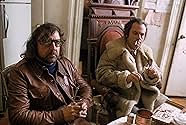Well, it was a complete dichotomy, because working with him was like working with two people. He was an ultra-talented person who was one of the fastest improvisers ever. He could add to and enrich a scene or character tremendously beyond what was written. On the other hand, he could take it too far and detract from the quality of humor when it was his own. He was too complicated because he was so insecure. If he had reached the saturation point with the particular innovations he was making and you said 'yeah, I don't think we should go any further with this,' he would take it very personally as though you were putting him down as a friend. He thought you were withdrawing your affection from him or whatever he felt was there. Then he would just get more and more into the improvisation as though he were going to insist on it because then your suggestion would represent more than just the quality of the material. For Sellers, it would represent something excruciatingly personal, which was a lot more important than the movie or any of the aesthetics involved. So it was tough because it was a constant balancing act.















